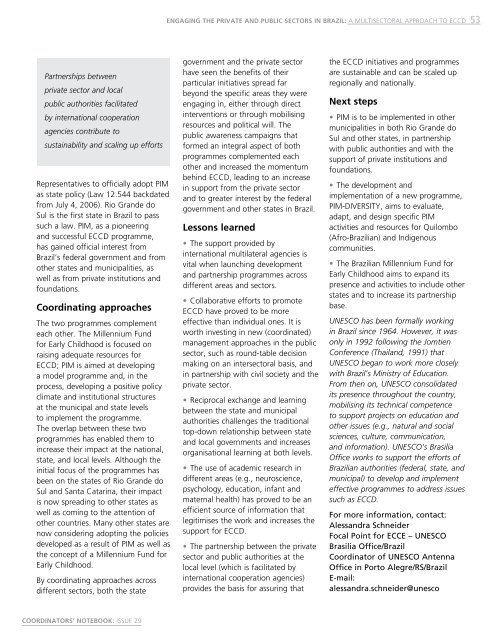A global call to action for early childhood
A global call to action for early childhood
A global call to action for early childhood
Create successful ePaper yourself
Turn your PDF publications into a flip-book with our unique Google optimized e-Paper software.
Engaging the private and public sec<strong>to</strong>rs in Brazil: A multisec<strong>to</strong>ral approach <strong>to</strong> ECCD<br />
53<br />
Partnerships between<br />
private sec<strong>to</strong>r and local<br />
public authorities facilitated<br />
by international cooperation<br />
agencies contribute <strong>to</strong><br />
sustainability and scaling up ef<strong>for</strong>ts<br />
Representatives <strong>to</strong> officially adopt PIM<br />
as state policy (Law 12.544 backdated<br />
from July 4, 2006). Rio Grande do<br />
Sul is the first state in Brazil <strong>to</strong> pass<br />
such a law. PIM, as a pioneering<br />
and successful ECCD programme,<br />
has gained official interest from<br />
Brazil’s federal government and from<br />
other states and municipalities, as<br />
well as from private institutions and<br />
foundations.<br />
Coordinating approaches<br />
The two programmes complement<br />
each other. The Millennium Fund<br />
<strong>for</strong> Early Childhood is focused on<br />
raising adequate resources <strong>for</strong><br />
ECCD; PIM is aimed at developing<br />
a model programme and, in the<br />
process, developing a positive policy<br />
climate and institutional structures<br />
at the municipal and state levels<br />
<strong>to</strong> implement the programme.<br />
The overlap between these two<br />
programmes has enabled them <strong>to</strong><br />
increase their impact at the national,<br />
state, and local levels. Although the<br />
initial focus of the programmes has<br />
been on the states of Rio Grande do<br />
Sul and Santa Catarina, their impact<br />
is now spreading <strong>to</strong> other states as<br />
well as coming <strong>to</strong> the attention of<br />
other countries. Many other states are<br />
now considering adopting the policies<br />
developed as a result of PIM as well as<br />
the concept of a Millennium Fund <strong>for</strong><br />
Early Childhood.<br />
By coordinating approaches across<br />
different sec<strong>to</strong>rs, both the state<br />
government and the private sec<strong>to</strong>r<br />
have seen the benefits of their<br />
particular initiatives spread far<br />
beyond the specific areas they were<br />
engaging in, either through direct<br />
interventions or through mobilising<br />
resources and political will. The<br />
public awareness campaigns that<br />
<strong>for</strong>med an integral aspect of both<br />
programmes complemented each<br />
other and increased the momentum<br />
behind ECCD, leading <strong>to</strong> an increase<br />
in support from the private sec<strong>to</strong>r<br />
and <strong>to</strong> greater interest by the federal<br />
government and other states in Brazil.<br />
Lessons learned<br />
• The support provided by<br />
international multilateral agencies is<br />
vital when launching development<br />
and partnership programmes across<br />
different areas and sec<strong>to</strong>rs.<br />
• Collaborative ef<strong>for</strong>ts <strong>to</strong> promote<br />
ECCD have proved <strong>to</strong> be more<br />
effective than individual ones. It is<br />
worth investing in new (coordinated)<br />
management approaches in the public<br />
sec<strong>to</strong>r, such as round-table decision<br />
making on an intersec<strong>to</strong>ral basis, and<br />
in partnership with civil society and the<br />
private sec<strong>to</strong>r.<br />
• Reciprocal exchange and learning<br />
between the state and municipal<br />
authorities challenges the traditional<br />
<strong>to</strong>p-down relationship between state<br />
and local governments and increases<br />
organisational learning at both levels.<br />
• The use of academic research in<br />
different areas (e.g., neuroscience,<br />
psychology, education, infant and<br />
maternal health) has proved <strong>to</strong> be an<br />
efficient source of in<strong>for</strong>mation that<br />
legitimises the work and increases the<br />
support <strong>for</strong> ECCD.<br />
• The partnership between the private<br />
sec<strong>to</strong>r and public authorities at the<br />
local level (which is facilitated by<br />
international cooperation agencies)<br />
provides the basis <strong>for</strong> assuring that<br />
the ECCD initiatives and programmes<br />
are sustainable and can be scaled up<br />
regionally and nationally.<br />
Next steps<br />
• PIM is <strong>to</strong> be implemented in other<br />
municipalities in both Rio Grande do<br />
Sul and other states, in partnership<br />
with public authorities and with the<br />
support of private institutions and<br />
foundations.<br />
• The development and<br />
implementation of a new programme,<br />
PIM-DIVERSITY, aims <strong>to</strong> evaluate,<br />
adapt, and design specific PIM<br />
activities and resources <strong>for</strong> Quilombo<br />
(Afro-Brazilian) and Indigenous<br />
communities.<br />
• The Brazilian Millennium Fund <strong>for</strong><br />
Early Childhood aims <strong>to</strong> expand its<br />
presence and activities <strong>to</strong> include other<br />
states and <strong>to</strong> increase its partnership<br />
base.<br />
UNESCO has been <strong>for</strong>mally working<br />
in Brazil since 1964. However, it was<br />
only in 1992 following the Jomtien<br />
Conference (Thailand, 1991) that<br />
UNESCO began <strong>to</strong> work more closely<br />
with Brazil’s Ministry of Education.<br />
From then on, UNESCO consolidated<br />
its presence throughout the country,<br />
mobilising its technical competence<br />
<strong>to</strong> support projects on education and<br />
other issues (e.g., natural and social<br />
sciences, culture, communication,<br />
and in<strong>for</strong>mation). UNESCO’s Brasilia<br />
Office works <strong>to</strong> support the ef<strong>for</strong>ts of<br />
Brazilian authorities (federal, state, and<br />
municipal) <strong>to</strong> develop and implement<br />
effective programmes <strong>to</strong> address issues<br />
such as ECCD.<br />
For more in<strong>for</strong>mation, contact:<br />
Alessandra Schneider<br />
Focal Point <strong>for</strong> ECCE – UNESCO<br />
Brasilia Office/Brazil<br />
Coordina<strong>to</strong>r of UNESCO Antenna<br />
Office in Por<strong>to</strong> Alegre/RS/Brazil<br />
E-mail:<br />
alessandra.schneider@unesco<br />
COORDINATORS’ NOTEBOOK: ISSUE 29
















